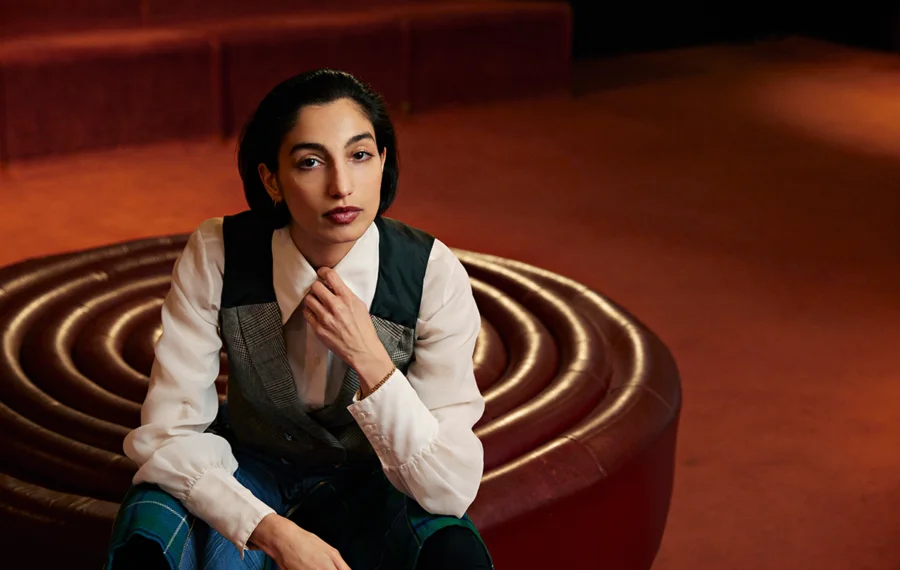
2023-01-30
Process waves and eco-feminist sci-fi
Two years ago, Sara Soltani Boljak started writing what would become her first script. Now she’s working on parallel projects on everything from father-son relationships to eco-feminist sci-fi. We talked about her love-hate relationship with movies and the importance of reading to write.
Can you tell us what you are working on right now?
– Right now I’m writing a feature film – a sci-fi movie – about eco-feminism and love, a sitcom about a really odd family, and the final script version of my own short film. I’m also writing things that are going into production now, such as a comedy about a father and son going on a sun vacation. This fall I will also be directing a project abroad. I can’t say much more than that it’s big, heavy and beautiful.
How did you start writing for film?
– I started writing in 2017, kind of secretly. I didn’t really know that I was writing scripts. I was building a world that I fell in love with and realized, very slowly, that I was writing a script. Then it was more about daring to apply to a university, because no one tells you that it’s perfectly possible even without a final grade.
Can you tell us a bit about your process, how do you approach a new project?
– Haha, my process. I myself am brand new to my process and am beginning to understand how I actually work, as opposed to how I think I work. There are clear waves in my work, emotional waves. I didn’t know that before. I had never worked on something that I care about so much over time.
The process starts with a feeling, a thought or a message that almost makes me shake. On the inside. Then comes a period of writing. But after a while I start hating the movie, really hating it. It’s like I have movie PMS. Then you just have to keep going, use all the tools you know work for you: methodical work with characters and the world and structure until it goes away. Usually it happens when you see something or hear something out in the world, like unexpected feedback or an unexpected conversation that highlights something that makes you shake inside again. Here it becomes clear that the training has a purpose – without it, I think many people, or at least me, would get stuck. Then it is so grateful to have done all that “boring” work, or what to call it. Because here it burns again and the movie flies out. Then it doesn’t matter if it’s written a little sloppily because the story has found its form, its center of gravity.
Once the script is ready, what is it like to hand it over to a director and a film crew? How do you find a good collaboration?
– It’s terrible to hand over. I imagine it gets a bit easier the more scripts you write, but damn, it’s hard with the first stuff. But that’s also a bit what making a movie is. A collaboration. It’s still quite exciting to hand over the script to a skilled director who manages to transform the text into directives that actors can follow or understand. The script is supposed to be a kind of instruction, like a blueprint. It is not a finished work in itself – although a beautiful, well-written script can feel magical to read.
Have you had any really bad script ideas that you can share?
– I don’t know if it matters that it’s bad; in many ways a bad idea can be turned into something incredible if it has substance. Quite often I find my work is filled with bad ideas actually.
The basis has to be good – you have to know where you’re going, but you can fill it with a lot of crap if you know it’s crap. Then people will come in and tinker with the script: you’ll have a chat with a friend, colleague, producer, director, photographer, and then – if you’re lucky and skilled – you’ll end up with a script that’s good.
What is your advice for those who dream of becoming a screenwriter? How do you get started?
– I don’t know how I feel about this kind of advice. Everyone has different circumstances, but the advantage of wanting to become a screenwriter is that it almost always starts with you. You are the writer and you can start writing whenever you want. I think that the most important thing is to have an idea and dare to work with it.
I would also recommend reading other people’s scripts, it has helped me a lot. The first few months when I was at the Film House I was reading 12 scripts a week, making sure to read people’s “first” films. All the big names started somewhere and often it wasn’t a great work as you might think.
You’ve spent a lot of time with us at Filmhuset. What is it like to work here?
It’s absolutely wonderful. Sitting here, at the beginning of my career (or whatever you want to call it), gave me such a great sense of legitimacy. I’ve been able to come here in all sorts of states of mind and it has really felt like my place. Then again, it’s a damn shame that it takes a place at the Film House for what I do to feel legitimate and real, important even. But it was exactly what I needed.
